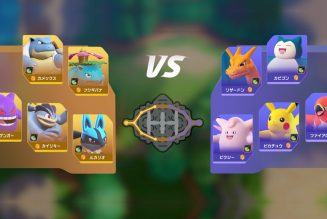
The layoffs happened suddenly. One day, Jose Abalos was employed, working on Disney Infinity 4. The next day, he was not. “It was something that upended everything, everything, all kinds of security,” he tells The Verge. “Everything just went belly-up in a single day.”
In May 2016, Disney Interactive shut down its internal studio, Avalanche Software, putting almost 300 employees out of work. For Abalos, there was an extra complication. He was working in the states on an H-1B1 visa, a limited program for workers in Singapore and Chile, that requires renewal every year. Abalos only had a month until his visa expired. Not only would he not get the padding of unemployment benefits for anything beyond that date, like his colleagues, but his visa would soon be void, forcing him to leave the country. His life went from “‘Hey, we’re working on Infinity 4, and this is awesome,’ to ‘Oh, shit. I need to find a job, like, now,’” he says.
Every year, developers immigrate to the United States to pursue careers in game development. For some people, like Abalos who grew up in Chile, the US offers more opportunity than their home countries, where development communities can be small. According to the Entertainment Software Association’s 2020 economic impact report, the US industry alone supports 143,000 jobs directly. It is home to major developers like Electronic Arts, Valve, and Activision Blizzard across cities big and small, including New York, Los Angeles, Seattle, San Francisco, Salt Lake City, and Raleigh.
Regardless of location, however, maintaining a successful game development career is always a challenge. Every year, studios suffer major layoffs, uprooting the lives of their employees. For immigrant workers, the problem is more complex. They don’t just lose a job. They might be forced to abandon their lives entirely and leave the country. This fear trickles down into different aspects of their careers, limiting where developers can afford to take jobs and how much leverage they have to ask for better pay or work conditions once they’re in.
“It was every day, just desperately looking at job searches,” Abalos says. “Whoever wants to take me, I’ll do it.”
For developers here on visas, time is of the essence. In October 2020, Jennifer Scheurle lost her job suddenly after the project she’d been working on was canceled. Under her O-1 visa, which is given to people with “extraordinary ability or achievement,” she had only 60 days to transfer her visa to another company or leave the country. She started her job hunt that day. “Within the games industry, specifically, getting hired within two to three months is just not a thing, or really rare and difficult to do,” she tells The Verge.
Her health insurance would run out in roughly two weeks. “I lost my ability to go and see my therapist because I didn’t have coverage anymore, which is tough when you’re trying to figure out how to get your life in order,” she says. The project she’d poured her heart into for years was suddenly gone. Her life was thrown into a pressurized timeline of just 60 days, which she says is just not enough. “You have zero time to process what just happened to you. You have zero time to just understand what that means for your life.”
The process can — and usually does — take months. Recruiters typically wait to attract a wide pool of candidates, who then go through an intensive screening and interview process. Developers may ask a candidate to meet large swaths of their teams, which adds up to hours of interviews. (Pre-COVID, this usually meant in-person gauntlets where a prospective hire could come to the company’s campus for an eight-hour day. As the industry works from home, more of that process is now relegated to video calls.) The long production time on video games, which take years to build, means companies must carefully consider who they want to bring on board.
Scheurle describes a loss of agency in her own life. “I felt like it was not on my own terms,” she says. “I was forced into terms and decisions dictated by this timeline and the [US visa process], instead of me having a minute to think about what I want next.”
Contributions from immigrant developers are crucial to maintaining a diverse, and therefore strong, workforce. Employers want to cast a wide net, a recruiter within the games industry tells The Verge; it’s in a company’s best interest to explore talents, technical and artistic, that are vastly different from what they might find in the US alone. It’s impossible to directly track how this loss of talent impacts projects, both those being made now and yet to come. But that loss does exist.
Problems don’t just apply to developers in the midst of their careers, but also to young developers hoping to find a job out of college. Raj* came to the States as a student and was, by all accounts, on a successful path. His game was nominated for student awards and received press coverage and accolades. With a strong portfolio and plans to publish his game, he hoped to start a visa process that would help him stay in the country. His team’s dreams for publishing through Nintendo, however, and later a crowdfunding effort, fell through.
It was late April, and his visa was set to expire in May. He’d recently gotten engaged. At the behest of his lawyers, he was told not to leave the country, but rather start the green card process and try for parole that would allow him to stay in the country past his visa’s expiration. “We dropped everything to get this done within the two weeks we had,” Raj says. Instead of spending the year planning his wedding, he and his fiancé held a short ceremony in his in-laws’ backyard. His parents weren’t able to attend, but instead Skyped in. “We had to get everyone on the same page so quickly but we managed it somehow, and got the application submitted within time. Now I just had to wait.”
And he did, for nearly seven months. The initial estimate of three months had stretched on, as complications arose from Trump administration policies. In the meantime, he was unable to take on any work. He was told “to stay indoors as much as possible so as to stay away from ICE agents. There was a very real concern on my lawyer’s end that I could mistakenly end up in a border camp.”
That time was challenging for Raj, a self-proclaimed nervous wreck who was “basically under house arrest” for fear of being deported. “I’d now been in the US for months on end with an expired visa and we were terrified we’d hear a knock on the door and it would be an ICE agent,” he says. “I had no idea how long this would continue, or when we’d run out of money. I knew I wasn’t doing well mentally at this point but we couldn’t afford therapy, and I no longer had access to any form of insurance, nor could I apply for any.”
The problem is compounded by the need for many developers who come to the US on visas to have senior-level experience or positions already, the recruiter tells The Verge. Their on-paper qualifications and even country of origin vastly impact the kind of visa they might be able to apply for. Even with a job offer, some developers have had to forfeit those positions because the company couldn’t work out visa issues. Contract work is often inaccessible to developers not able to work in the US. “It’s an impossible fucking process where we lose out on talent on such a massive scale,” Scheurle says. Developers with less experience aren’t allowed to work in positions that might get them the skills they need to ascend to senior talent.
It also keeps developers from seeking out smaller companies that might afford them better or more creative opportunities in favor of a larger developer with a bigger bank. To get a visa, any visa, costs thousands of dollars and the help of a good immigration lawyer; some visas, like H-1B, follow strict timelines and approval caps. There’s little margin for error.
“At the end of the day, the company also has to make a request for the visa, and the smaller companies just don’t know how to deal with it,” Abalos says. “Whereas a big company, like, say, Activision or Ubisoft, they have entire departments that deal only with that. That’s their sole purpose.”
It’s an exhausting amount of pressure. “There were points, like, why do I even keep bother trying?” Abalos says. “I mean, should I just start focusing instead on packing everything up and leaving.” Scheurle says the experience made her doubtful that she’d ever want to return to the States. “I love the US and the people as a place,” she says. “I just don’t ever want to go through that again. I want to be somewhere where people appreciate the humanity and what it means to move countries.”
Abalos was able to find a job and stay in the country, while Scheurle took a job in Vancouver. Raj still works in games today but says the trauma of his visa struggles continues to affect him. “I still have episodes now and then, and I can’t cope with high pressure environments like I used to,” he says.
Many of the developers The Verge spoke to still consider themselves to be privileged cases, whether because of their race, education, or financial status. They call themselves examples of best-case scenarios: people who either managed to stay in the country or found lucrative jobs elsewhere.
Reflecting on his own experience, Raj, too, sees what he considers privileges. “I would have been deported a hundred times over without all the advantages I had,” he says, pointing to things like his industry accolades, financial support from his family, and access to an immigration lawyer. He calls his ordeal a hellish experience, but still one with positive outcomes that include a happy marriage. “I know from hearing what friends have also gone through that the stories we don’t hear are even more frightening, even more tragic.” The US, in particular, became a harder place for any immigrant to work under Trump.
“I hope that in sharing my story,” Raj says, “a story where things ‘worked out,’ it helps people have more understanding and empathy for the ones that didn’t.”
*Name has been changed to protect the individual’s identity.









